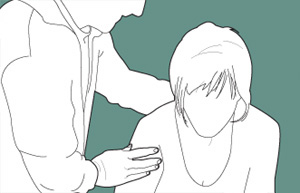Related Research Articles

Antidepressants are a class of medications used to treat major depressive disorder, anxiety disorders, chronic pain, and addiction.

Major depressive disorder (MDD), also known as clinical depression, is a mental disorder characterized by at least two weeks of pervasive low mood, low self-esteem, and loss of interest or pleasure in normally enjoyable activities. Introduced by a group of US clinicians in the mid-1970s, the term was adopted by the American Psychiatric Association for this symptom cluster under mood disorders in the 1980 version of the Diagnostic and Statistical Manual of Mental Disorders (DSM-III), and has become widely used since. The disorder causes the second-most years lived with disability, after lower back pain.

Monoamine oxidase inhibitors (MAOIs) are a class of drugs that inhibit the activity of one or both monoamine oxidase enzymes: monoamine oxidase A (MAO-A) and monoamine oxidase B (MAO-B). They are best known as effective antidepressants, especially for treatment-resistant depression and atypical depression. They are also used to treat panic disorder, social anxiety disorder, Parkinson's disease, and several other disorders.

Seasonal affective disorder (SAD) is a mood disorder subset in which people who typically have normal mental health throughout most of the year exhibit depressive symptoms at the same time each year. It is commonly, but not always, associated with the reductions or increases in total daily sunlight hours that occur during the summer or winter.

Psychotic depression, also known as depressive psychosis, is a major depressive episode that is accompanied by psychotic symptoms. It can occur in the context of bipolar disorder or major depressive disorder. It can be difficult to distinguish from schizoaffective disorder, a diagnosis that requires the presence of psychotic symptoms for at least two weeks without any mood symptoms present. Unipolar psychotic depression requires that psychotic symptoms occur during severe depressive episodes, although residual psychotic symptoms may also be present in between episodes. Diagnosis using the DSM-5 involves meeting the criteria for a major depressive episode, along with the criteria for "mood-congruent or mood-incongruent psychotic features" specifier.
Interpersonal and social rhythm therapy (IPSRT) is an intervention for people with bipolar disorder (BD). Its primary focus is stabilizing the circadian rhythm disruptions that are common among people with bipolar disorder (BD). IPSRT draws upon principles from interpersonal psychotherapy, an evidence-based treatment for depression and emphasizes the importance of daily routine (rhythm).
The clinical global impression (CGI) rating scales are measures of symptom severity, treatment response and the efficacy of treatments in treatment studies of patients with mental disorders. It is a brief 3-item observer-rated scale that can be used in clinical practice as well as in researches to track symptom changes. It was developed by Early Clinical Drug Evaluation Program (ECDEU) team of researchers for use in NIMH-led clinical trials that could provide clinical judgment based assessment for determining the severity of symptoms and the treatment progress. This was meant to assess the patient's functioning prior to and after initiating medication in trials which is an important part of study process. Its 3 items assess, 1) Severity of Illness (CGI-S), 2) Global Improvement (CGI-I), and 3) Efficacy Index. Many researchers, while recognizing the validity of the scale, consider it to be subjective as it requires the user of the scale to compare the subjects to typical patients in the clinician experience.
The emphasis of the treatment of bipolar disorder is on effective management of the long-term course of the illness, which can involve treatment of emergent symptoms. Treatment methods include pharmacological and psychological techniques.
Interpersonal psychotherapy (IPT) is a brief, attachment-focused psychotherapy that centers on resolving interpersonal problems and symptomatic recovery. It is an empirically supported treatment (EST) that follows a highly structured and time-limited approach and is intended to be completed within 12–16 weeks. IPT is based on the principle that relationships and life events impact mood and that the reverse is also true. It was developed by Gerald Klerman and Myrna Weissman for major depression in the 1970s and has since been adapted for other mental disorders. IPT is an empirically validated intervention for depressive disorders, and is more effective when used in combination with psychiatric medications. Along with cognitive behavioral therapy (CBT), IPT is recommended in treatment guidelines as a psychosocial treatment of choice for depression.
Bipolar II disorder (BP-II) is a mood disorder on the bipolar spectrum, characterized by at least one episode of hypomania and at least one episode of major depression. Diagnosis for BP-II requires that the individual must never have experienced a full manic episode. Otherwise, one manic episode meets the criteria for bipolar I disorder (BP-I).

Dennis S. Charney is an American biological psychiatrist and researcher, with expertise in the neurobiology and treatment of mood and anxiety disorders. He is the author of Neurobiology of Mental Illness, The Physician's Guide to Depression and Bipolar Disorders and Molecular Biology for the Clinician, as well as the author of over 600 original papers and chapters. In 2022, he was listed #52 on Research.com's "Top Medicine Scientists in the United States," with an h-index of 194 with 146,109 citations across 651 publications. Charney is known for demonstrating that ketamine is effective for treating depression. Ketamine's use as a rapidly-acting anti-depressant is recognized as a breakthrough treatment in mental illness.
Management of depression is the treatment of depression that may involve a number of different therapies: medications, behavior therapy, psychotherapy, and medical devices.

Panic disorder is a mental and behavioral disorder, specifically an anxiety disorder characterized by reoccurring unexpected panic attacks. Panic attacks are sudden periods of intense fear that may include palpitations, sweating, shaking, shortness of breath, numbness, or a feeling that something terrible is going to happen. The maximum degree of symptoms occurs within minutes. There may be ongoing worries about having further attacks and avoidance of places where attacks have occurred in the past.
Allen J. Frances is an American psychiatrist. He is currently Professor and Chairman Emeritus of the Department of Psychiatry and Behavioral Sciences at Duke University School of Medicine. He is best known for serving as chair of the American Psychiatric Association task force overseeing the development and revision of the fourth edition of the Diagnostic and Statistical Manual of Mental Disorders (DSM-IV). Frances is the founding editor of two well-known psychiatric journals: the Journal of Personality Disorders and the Journal of Psychiatric Practice.
Glyn Lewis is a British professor of psychiatric epidemiology and the current head of the Division of Psychiatry at University College London

Lori Altshuler was a professor at the University of California, Los Angeles (UCLA) Department of Psychiatry and Biobehavioral Sciences and held the Julia S. Gouw Endowed Chair for Mood Disorders. Altshuler was the Director of the UCLA Mood Disorders Research Program and the UCLA Women's Life Center, each being part of the Neuropsychiatric Hospital at UCLA.
Ellen Frank is a psychologist and Distinguished Professor Emeritus of Psychiatry and Distinguished Professor of Psychology at the University of Pittsburgh. She is known in the field of Psychotherapy as one of the developers of Interpersonal and Social Rhythm Therapy, which aims to treat bipolar disorder by correcting disruptions in the circadian rhythm while promoting increased regularity of daily social routines. Frank is the co-founder and Chief Scientific Officer of HealthRhythms, a company that uses mobile technology to monitor the health and mental health of clients, facilitate the detection of changes in their status, and better manage mental health conditions.

Myrna Milgram Weissman is Diane Goldman Kemper Family Professor of Epidemiology in Psychiatry at the Vagelos College of Physicians and Surgeons and Mailman School of Public Health, Columbia University, and Chief of the Division of Translational Epidemiology at the New York State Psychiatric Institute. She is an epidemiologist known for her research on the prevalence of psychiatric disorders and psychiatric epidemiology, as it pertains to rates and risks of anxiety and mood disorders across generations. Among her many influential works are longitudinal studies of the impact of parental depression on their children.

Prof. Robert Haim Belmaker, is an Israeli psychiatrist who has had major academic positions in Israeli psychiatry since 1974. He had a formative influence on biological directions in Israeli psychiatry. He was Hoffer-Vickar Professor of Psychiatry at Ben-Gurion University of the Negev, Beersheva Israel until his retirement and is now Emeritus.
Mauricio Tohen is a Mexican American research psychiatrist, Distinguished Professor, and Chairman of the Department of Psychiatry & Behavioral Sciences at the University of New Mexico. Tohen's research has focused on the epidemiology, outcome, and treatment of bipolar and psychotic disorders, and is especially known for innovating the design of clinical trials and the criteria to determine outcome in such diseases. Tohen has edited several books on his specialties. His social awareness has been noted in the promotion of programs to improve mental health care in areas such as substance abuse, bipolar disorder and schizophrenia.
References
- Who’s Who, Black Publishers Ltd London (http://www.ukwhoswho.com) Annual editions over many years from the 1980s
- Debrett’s People of Today, Debrett’s Ltd, Richmond Surrey 2011 (http://www.debretts.com/people/people-today-0) Annual editions from the 1990s
- Introduction of Honorary Fellow: Eugene Paykel. The Psychiatrist (Psychiatric Bulletin) (2001) 25: 491-493. The Royal College of Psychiatrists
- Eugene S Paykel interviewed By Thomas Ban, p301-307, in Volume 4 (Psychopharmacology) An Oral History of Neuropsychopharmacology: The First Fifty Years, Peer Interviews Ed Thomas Ban Volume 4 Psychopharmacology Volume Editor Jerome Levine ISBN 9781461161677 American College of Neuropsychpharmacology Brentwood Tennessee (ii) E S Paykel e-interview. Psychiatric Bulletin (2007) 31 (1) 40